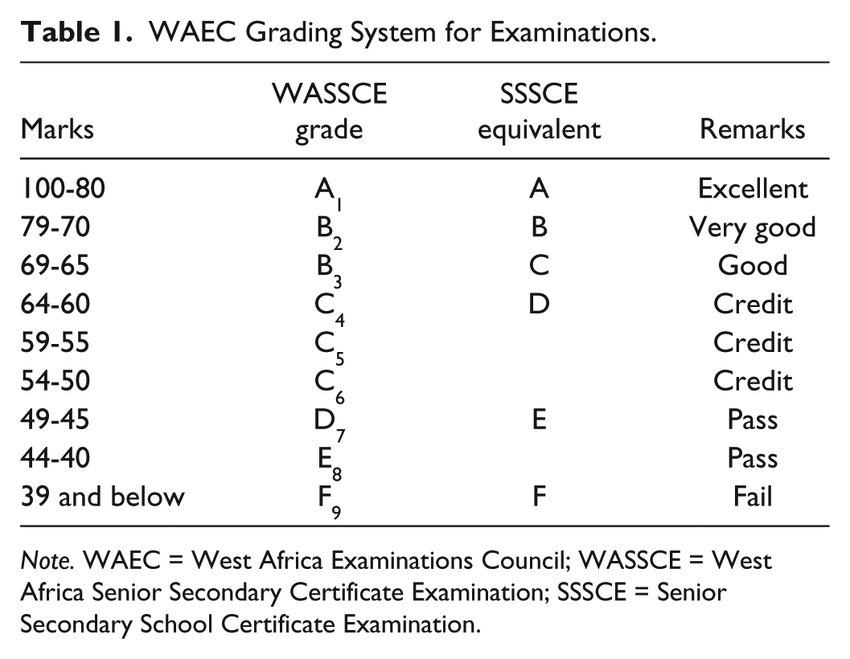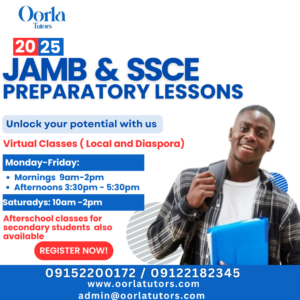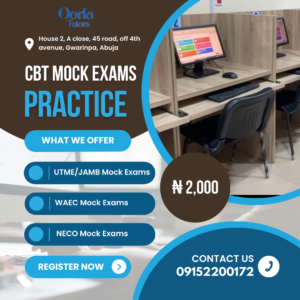Excelling in Junior and Senior WAEC Examinations
Success in the WAEC examinations is a pivotal goal for many Nigerian students, serving as a benchmark for academic proficiency and a gateway to higher educational opportunities. Excelling in these exams requires hard work, intelligence, strategic planning, and execution. At Oorla Tutors, we specialise in equipping students with the tools and knowledge necessary to excel in both Junior and Senior WAEC examinations. Here are the refined strategies that our top-performing students employ to ensure success.
Understanding the WAEC Framework:
The WAEC exams are standardised tests administered by the West African Examinations Council across five English-speaking countries in West Africa. They are designed to evaluate a student’s knowledge and readiness for tertiary education or the job market. Understanding the format, subjects covered, and the grading system is crucial for any student aiming to excel (WAEC, 2021).
Early Preparation is Key:
Commence your study regimen well before the exam date. Early preparation reduces anxiety and allows ample time to review all necessary material thoroughly. Create a realistic study timetable that allocates time for each subject based on your strengths and weaknesses. This structured study approach helps ensure that no subject is neglected (Dunlosky et al., 2013).
Master the WAEC Syllabus:
The syllabus for each subject outlines what the WAEC Council expects students to know. Please familiarise yourself with this syllabus, as it will serve as a guide to the most relevant topics and themes. Target your study around these syllabi, focusing on the learning objectives provided for each topic.
Effective Study Techniques:
Employ active study techniques that enhance retention and understanding. These include mnemonic devices for memorisation, frequent self-testing to assess knowledge, and teaching concepts to others to reinforce understanding. Incorporating these techniques into your study routine can dramatically improve your recall and comprehension (Oakley, 2014).
Utilise Past Exam Papers:
One of the most effective tools in preparing for WAEC exams is practising with past papers. These papers provide insight into the question formats, frequently tested topics and timing. Regularly timing yourself while taking these past exams can also improve your time management skills, a crucial aspect of your exam strategy (BBC, 2014).
Customised Tutoring Support:
Personalized tutoring can address specific areas of weakness and provide expert guidance tailored to the WAEC exams. Oorla Tutors offers customised tutoring that aligns with the WAEC curriculum, focusing on students’ unique needs and learning styles. This tailored approach ensures that students maximise their study time and resources.
Stay Informed and Updated:
Keep abreast of any updates or changes in the examination guidelines. WAEC occasionally revises the syllabus or exam rules, and staying informed ensures that you study the correct material and follow the proper procedures.
Regular Breaks and Self-Care:
While studying is crucial, so is taking care of your mental and physical health. Regular breaks, a balanced diet, adequate sleep, and physical exercise are essential to an effective study routine. They help maintain high energy levels, reduce stress, and improve concentration (Peleg, 2012).
Mock Exams and Review:
Conduct mock exams under actual exam conditions. Afterwards, thoroughly review your answers. This exercise will highlight areas that need further revision and familiarise you with the exam’s pacing. Oorla Tutors conducts mock exams to simulate the WAEC experience, providing students valuable feedback.
Exam Day Strategies:
On the exam day, arrive early and be prepared with all necessary materials. During the exam, read all instructions carefully, allocate time-based on the marks assigned to each question, and review your answers if time permits.
Post-Exam Review After each paper, take the time to reflect on what went well and what could be improved. This review can help you adjust your approach for subsequent exams, enhancing your performance (Wiliam, 2011).
Conclusion:
Success in the WAEC examinations doesn’t come from last-minute cramming but from a consistent, strategic approach to learning and revision. By understanding the exam structure, starting early, using effective study techniques, and taking care of your well-being, you can enhance your performance and achieve your desired grades.
References:
WAEC. (2021). The West African Examinations Council. WAEC
Dunlosky, J., Rawson, K. A., Marsh, E. J., Nathan, M. J., & Willingham, D. T. (2013). Improving Students’ Learning With Effective Learning Techniques. Psychological Science in the Public Interest, 14(1), 4-58.
Oakley, B. (2014). A Mind for Numbers: How to Excel at Math and Science (Even If You Flunked Algebra). TarcherPerigee.
BBC. (2014). Revision Techniques – The Good, the OK and the Useless. BBC news
Peleg, O. (2012). The Relation Between Differentiation and Self-Regulated Learning in Science Classes. International Journal of Science and Mathematics Education, 10, 581–610.
Wiliam, D. (2011). What is assessment for learning? Studies in Educational Evaluation, 37(1), 3-14.



